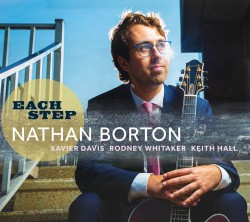MUSIC REVIEW BY Jack Bowers, All About Jazz
4-STARS Judging from recent album releases, the guitar remains an essential part of the contemporary jazz scene. The latest example among many is this tasteful session led by Kansas-born, Michigan-based Nathan Borton, adding his name to an ample roster of newly minted guitar-led or guitar-centered albums by Doug MacDonald, Graham Dechter, Kristian Borring, Randy Napoleon, John Moulder, Hendrik Braeckman, Paul Bollenback, Matt Dingledine and others. What does Borton have that they may not? When it comes to technique and perception—that is, actually playing guitar and conveying to the listener one's concepts and vision—that's hard to say, as every one of them is resourceful and articulate.
What Borton does have is a penchant for variety (he moves from trio to quartet, quintet and even sextet on two selections), a keen ear for melody, and a clean, no-nonsense way of swinging that is at least on a par with any of the above mentioned artists, perhaps in part because of his musical inspirations who include Wes Montgomery and Grant Green. Borton also has an enviable supporting cast that includes pianist Xavier Davis, bassist Rodney Whitaker and drummer Keith Hall, with tenor saxophonist Diego Rivera sitting in on three numbers, bass trombonist Chris Glassman on two.
Borton opens with a pair of themes by the quartet, his own "Each Step" and Cole Porter's "Just One of Those Things," narrowing to a trio on the lovely Mack Gordon/Harry Warren ballad, "The More I See You." Rivera comes aboard for Joseph Herbst's offbeat arrangement of Miles Davis' "Milestones" (at least that's what it says on the playlist), which precedes Borton's "What Now?" and Napoleon's "These Are the Things We Throw Away." Curiously, "What Now?" calls to mind the standard "Fascination," "These Are the Things" yet another, "I'm in the Mood for Love." The sextet performs on Borton's easygoing "Change," the quartet on the last two numbers, Green's boppish "Grantstand" and Borton's blues-drenched salute to Green, "Grant's Groove," on which Davis moves smoothly to electric keyboard.
Borton's quartet is exemplary, Rivera adds splashes of warmth, and the choice of material is superb. There's not much to find fault with on a date as burnished and well-drawn as this.
What Borton does have is a penchant for variety (he moves from trio to quartet, quintet and even sextet on two selections), a keen ear for melody, and a clean, no-nonsense way of swinging that is at least on a par with any of the above mentioned artists, perhaps in part because of his musical inspirations who include Wes Montgomery and Grant Green. Borton also has an enviable supporting cast that includes pianist Xavier Davis, bassist Rodney Whitaker and drummer Keith Hall, with tenor saxophonist Diego Rivera sitting in on three numbers, bass trombonist Chris Glassman on two.
Borton opens with a pair of themes by the quartet, his own "Each Step" and Cole Porter's "Just One of Those Things," narrowing to a trio on the lovely Mack Gordon/Harry Warren ballad, "The More I See You." Rivera comes aboard for Joseph Herbst's offbeat arrangement of Miles Davis' "Milestones" (at least that's what it says on the playlist), which precedes Borton's "What Now?" and Napoleon's "These Are the Things We Throw Away." Curiously, "What Now?" calls to mind the standard "Fascination," "These Are the Things" yet another, "I'm in the Mood for Love." The sextet performs on Borton's easygoing "Change," the quartet on the last two numbers, Green's boppish "Grantstand" and Borton's blues-drenched salute to Green, "Grant's Groove," on which Davis moves smoothly to electric keyboard.
Borton's quartet is exemplary, Rivera adds splashes of warmth, and the choice of material is superb. There's not much to find fault with on a date as burnished and well-drawn as this.
Soundclips
Other Reviews of
"Each Step":
Cirdec Songs by Cedric Hendrix
All About Jazz by Jane Kozhevnikova
Take Effect by Tom Haugen
Jazz Weekly by George W Harris
SEMJA (Michigan) by Linda Yohn
All About Jazz by Dan McClenaghan
